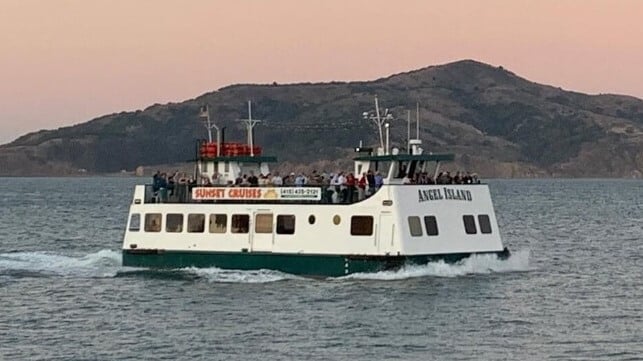Project for California's First Zero-Emission, Electric Short-Run Ferry

A new project expects to become the first to operate a zero-emission, electric propulsion short-route ferry in California starting in 2024. In addition to demonstrating the potential for converting existing vessels to electric propulsion, the project is in line with California’s tough new emission regulations that begin phasing in this year and include not only large commercial ships in port but also harbor craft and other small vessels ranging from tugs to ferries and fishing boats.
The vessel in this project is a 65-foot tourist craft, the Angel Island, operating in San Francisco Bay. The vessel which is the largest in the Angel Island-Tiburon Ferry Company fleet can carry up to 400 passengers. The vessel operates regular service from the city of Tiburon on the bay to Angel Island. It is also available for charters and runs sunset tourist cruises on the bay.
"We are very excited that the Angel Island will be the first of the short-run ferries in California to be 100 percent zero-emission, as our company continues supporting the natural environment of the Bay and our beautiful state park," said Captain Maggie McDonogh, fourth-generation owner and operator of the Angel Island ferry. "Getting adequate electricity to our ferry terminal is an essential part of this plan.”
California’s Pacific Gas and Electric Company is partnering in the project to bolster electricity transmission to the ferry terminal and support the installation of charging infrastructure. The electrification project also represents an important milestone for PG&E's Electric Vehicle Fleet Program, expanding the program's support of transportation electrification to include the marine sector.
"The Angel Island ferry is an important part of California history and Bay Area tourism, carrying hundreds of thousands of visitors to Angel Island State Park for nearly a half-century. We are excited to support and collaborate on its conversion to an electric propulsion vessel," said Lydia Krefta, PG&E's Director for Clean Energy Transportation.
California-based Green Yachts has been selected to transform the Angel Island into an electric propulsion vessel. The company highlights the importance of having a sufficient electrical supply for fast charging between ferry runs noting that the ferry requires 30 kWh to go one mile. “The increased energy requirement per mile shows the significant challenge associated with electrifying the marine sector," said Graham Balch, Managing Broker of Green Yachts.

that matters most
Get the latest maritime news delivered to your inbox daily.
As part of the 2030 clean energy goals outlined in PG&E's Climate Strategy Report, the company is aiming to proactively prepare the grid for 12,000 GWh of EV-related electric load and improve processes to enable rapid, safe EV energization and interconnection. It is also working to enable 2 million EVs to participate in vehicle-grid integration applications.
A year ago, in March 2022, the California Air Resources Board (CARB) approved updates to its Commercial Harbor Craft Regulation that it said is designed to reduce diesel soot and nitrogen oxides emission from commercial harbor craft including tugboats and ferries. The new regulations which are starting this year expand the coverage, requiring zero-emission options where feasible, and cleaner combustion Tier 3 and 4 engines on all other vessels. In addition, they will require the use of diesel particulate filters. The rules are the strictest in the nation expanding to the broadest range of harbor crafts.
